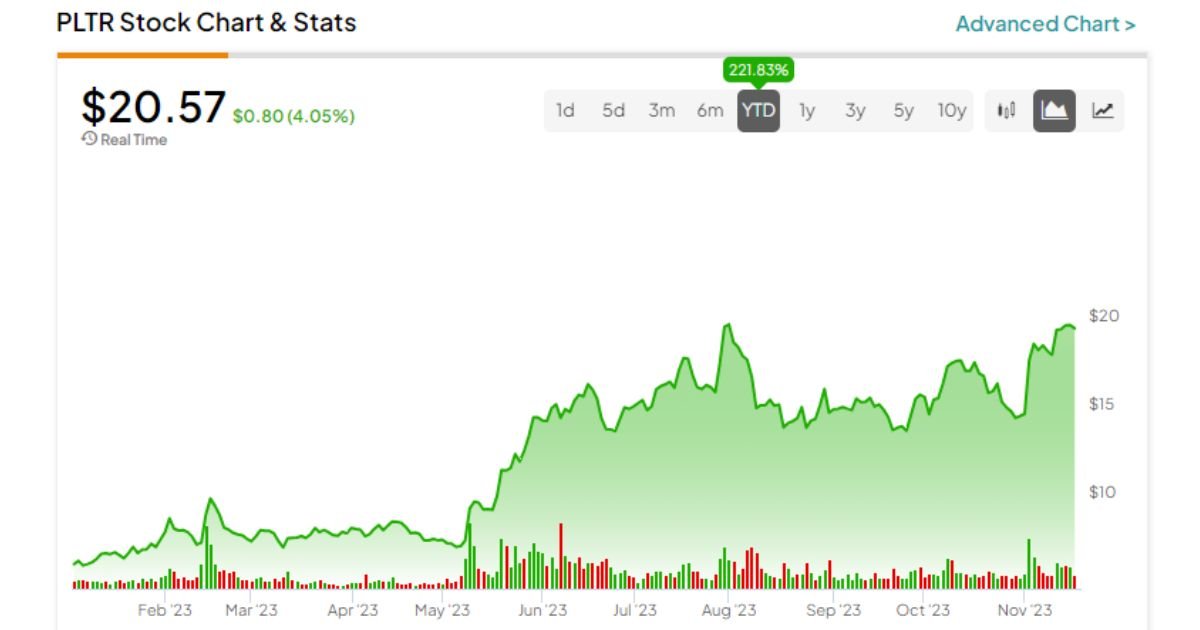
PLTR Palantir’s Share Price, Defense Role, and Market Outlook (Nasdaq: PLTR)
Palantir Technologies Inc. (NASDAQ: PLTR) has become one of the most talked-about technology companies on the U.S. stock market. Known for its deep involvement with data analytics, artificial intelligence (AI), and national defense projects, Palantir has built a unique reputation as both a Silicon Valley innovator and a trusted U.S. defense contractor. Recently, however, the company has come under the spotlight following reports about vulnerabilities in a U.S. Army communications system it helped develop. Despite this, Palantir continues to remain one of the most promising and controversial players in both the tech and defense industries.
Palantir’s Role in Modern Defense Technology
Palantir has long worked with U.S. military and intelligence agencies, helping them analyze vast amounts of data to support decision-making in complex operations. Its platforms—Gotham for government clients and Foundry for commercial use—are designed to integrate and interpret information from multiple sources quickly and securely.
Recently, the defense startup Anduril was acquired by Palantir to bring the battlefield communication system of the U.S. Army called NGC2 (Next Generation Command and Control) to a more modern state. The proposed project seeks to establish real-time communication between soldiers, vehicles, drones, and sensors so that the communication process in the battlefield becomes even faster and more precise.
Nevertheless, the U.S. Army Chief Technology Officer (CTO), Gabrielle Chiulli, issued a new internal memo, which created serious concerns. The document indicated that the NGC2 platform had a basic security issue and vulnerabilities that might result in a very high risk to the safety of the system. The memo explained that the platform was not properly controlled to regulate the access of the users and could not keep a track of or verify the security of the software at all times.
Palantir’s Response to Security Concerns
Following the report, both Anduril and Palantir released public statements addressing the issue.
Palantir clarified that no vulnerabilities were found in its own platform and that the concerns mentioned in the memo had already been fixed or were outdated. Anduril added that the report represented an “old snapshot” of the system’s early development phase and that significant improvements had already been made.
Army CIO Leonel Garciga, the boss of Chiulli, later affirmed that the majority of the issues reported in the memo had been addressed in a few days or weeks. He also pointed out that there was still one application that was still under minor vulnerabilities.
Nevertheless, the scandal had a temporary impact on the investor confidence, as the share price of Palantir (NASDAQ: PLTR) decreased by approximately 7.5 percent following the news release.
Why the U.S. Army Relies on Palantir
Palantir is not a traditional defense contractor. Unlike older firms that build tanks, jets, or missiles, Palantir specializes in data warfare—helping militaries use real-time analytics to make smarter, faster decisions. This makes Palantir essential in modern defense, where wars are fought not only on land but also in cyberspace and through information systems.
The company’s technology was used during U.S. operations in Afghanistan and by intelligence agencies for threat detection and counterterrorism. In 2025, Palantir continues to expand its defense footprint, becoming a key player in projects that combine AI, cloud computing, and autonomous systems.
Key Defense Contracts
Palantir has secured multiple high-value government contracts in recent years, strengthening its revenue base and reputation.
Some of the most notable deals include:
- A $480 million contract for Project Maven, an AI-powered software that analyzes battlefield imagery and sensor data to support quick decision-making.
- A major role in the NGC2 platform, a $100 million project led by Anduril, with participation from Palantir, Microsoft, and smaller defense firms.
- Several ongoing contracts with U.S. intelligence and defense agencies to manage data analytics systems that support national security.
These contracts demonstrate how deeply Palantir is embedded in U.S. defense operations, making it an irreplaceable partner for the Pentagon.
Palantir’s Share Price (NASDAQ: PLTR) Performance

The stock of Palantir (NASDAQ: PLTR) tends to be affected by government contracts and military relationships. High profile military and AI projects associated with the company tend to increase investor confidence, and scandals or an industry-wide crash of tech companies tend to cause short-term declines.
At the beginning of October 2025, Palantir share price has suffered a minor setback caused by the Army internal memo, however analysts continue to perceive the company as a long term growth stock. Its investors think that its singular niche of being on a level with Silicon Valley innovation and government defense makes it better placed in an ever-changing world of AI.
Palantir’s Business Model and Strengths
Palantir’s business revolves around two main segments:
- Government Contracts:
This includes defense, intelligence, and homeland security work. Palantir’s government clients account for a large portion of its revenue, providing long-term stability and guaranteed payments.
- Commercial Sector:
Palantir Foundry is used by private companies in healthcare, manufacturing, finance, and energy. The platform helps organizations integrate data to improve decision-making, supply chain efficiency, and risk management.
Its ability to serve both sectors effectively allows Palantir to maintain steady growth, even when government spending fluctuates.
Palantir’s Market Position and Valuation
Palantir has grown significantly since its 2020 IPO. Its current market capitalization stands in the tens of billions, driven by increasing adoption of its AI and data platforms worldwide. Investors are particularly optimistic about its role in artificial intelligence, defense modernization, and predictive analytics.
The company is also closely associated with the American defense agencies and this also gives it an exclusive edge that many tech companies cannot match. Nonetheless, reliance on government contracts may occasionally expose Palantir to change in policy or budget reduction in defence.
Palantir and Anduril: The New Face of Military Tech
Palantir and Anduril represent a new generation of defense companies that operate with Silicon Valley speed and creativity. While traditional arms manufacturers focus on hardware, these companies prioritize software-driven warfare—data, automation, and artificial intelligence.
Anduril, which is headed by Oculus founder Palmer Luckey, has recently won a 159 million dollar bid to develop a mixed-reality night vision system under the U.S. Army. Anduril and Palantir are redefining the way military technology will be developed, deployed, and updated.
But, the recent memo demonstrates that the innovation should be accompanied by strict cybersecurity to avoid vulnerabilities that can be used by the opponent.
Palantir’s Financial Overview (2025 Estimates)
| Category | Details / Estimated Value (USD) |
| Market Capitalization | $55–60 billion |
| Share Price (as of Oct 2025) | Around $21.30 |
| Annual Revenue (2024) | $2.25 billion |
| Net Income (2024) | $310 million |
| Major Government Contracts | Project Maven, NGC2, U.S. Army AI Programs |
| CEO | Alex Karp |
| Headquarters | Denver, Colorado, USA |
| Stock Exchange Listing | NASDAQ: PLTR |
Investor Sentiment and Future Outlook
Despite occasional controversies, Palantir remains one of the most promising AI defense companies on the stock market. Analysts expect the company’s revenue growth to continue as global demand for AI-driven security and intelligence tools increases.
The increased reliance of the U.S government on commercial technology companies in the production and modernization of the military opens Palantir a prospective future in getting billions of contracts. Furthermore, the fact that Palantir entered the business AI market brings one more growth prospect in addition to defense.
Nevertheless, investors should be wary. The defense sector is extremely regulated and any technical fault or political change can impact on Palantir reputation and share value.
Conclusion
Palantir Technologies (NASDAQ: PLTR) stands at the crossroads of technology and defense. The recent Army memo controversy may have raised eyebrows, but it also highlights the critical role Palantir plays in shaping the future of military and data infrastructure.
Its share price, while subject to short-term fluctuations, reflects a company deeply embedded in U.S. security strategy and the global AI revolution. With continuous government contracts, strong financials, and innovative AI platforms, Palantir’s long-term story remains powerful.
In 2025 and beyond, as the world leans more on artificial intelligence for security, logistics, and data management, Palantir’s influence is set to grow further—making NASDAQ: PLTR one of the most closely watched tech-defense stocks in the market today.
Also Read About: Palantir Stock News Today: Market Drop, Defense Contracts, and Future Outlook


